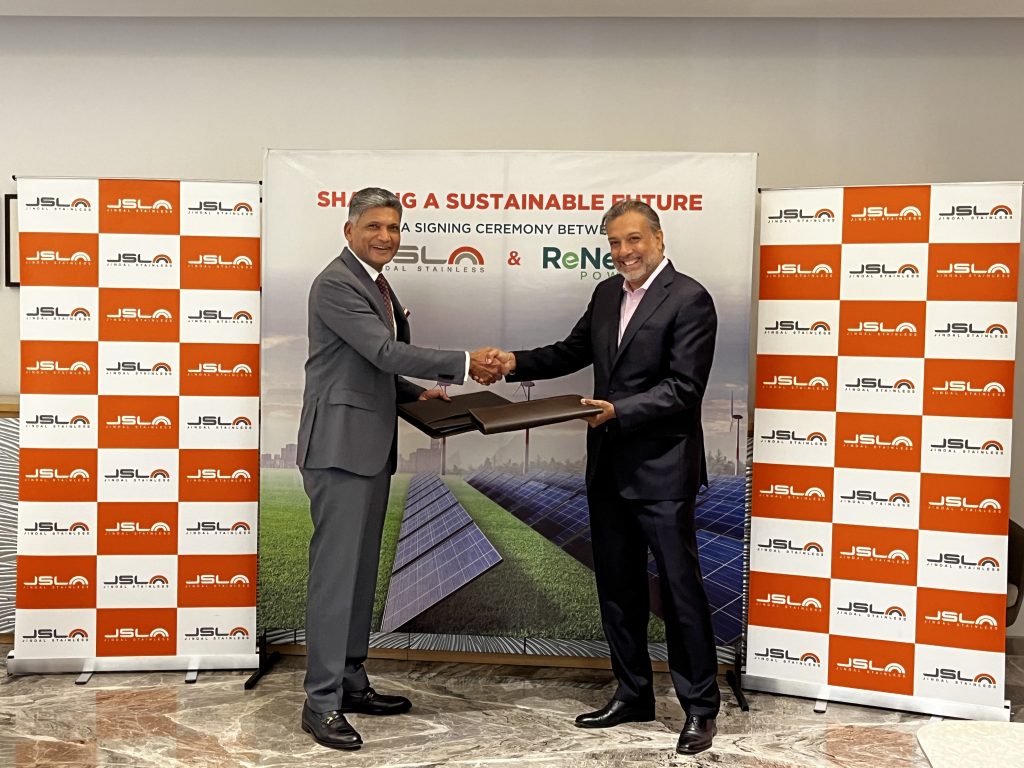
Monthly
Stainless Trivia
Fill in your answer below
The Wind-Solar hybrid Project to power Jindal Stainless’ increase in combined production capacity from 1.9 MTPA to 2.9 MTPA; Jindal Stainless to reach net zero emissions by 2050
Gurugram, December 5, 2022: India’s leading stainless-steel manufacturer, Jindal Stainless today signed a contract with the country’s largest renewable energy company, ReNew Power, to develop a utility-scale captive renewable energy project for the supply of power to its facility in Jajpur, Odisha. The Project will generate 700 million units per year through a mix of solar and wind technologies. This innovative Wind-Solar hybrid solution, with a high-Capacity Utilization Factor, is expected to generate a significantly higher amount of energy per unit of the contracted capacity. With this, ReNew Power also brings its Round the Clock (RTC) solution to the B2B space, which it pioneered for Utilities earlier last year. Moreover, a partnership with the largest renewable player also brings in the requisite execution certainty for Jindal Stainless, which is of paramount importance for a project of this scale.

The PPA was signed in the presence of Chairman, Mr Ratan Jindal; Managing Director (MD), Mr Abhyuday Jindal; Director, Mr Jagmohan Sood; Senior Vice President, Procurement, Mr Rajendra Pathak; Director and Group CFO, Mr Anurag Mantri, and Associate Vice President, Procurement, Mr Rajesh Jain from Jindal Stainless. From ReNew Power, Founder, Chairman, and CEO, Mr Sumant Sinha; Chief Commercial Officer, Mr Mayank Bansal; Business Head, Mr Rahula Kashyapa, and Assistant Vice President, Mr Dheeraj Ahuja were present on the occasion.
Commenting on the collaboration, MD, Jindal Stainless, Mr Abhyuday Jindal said, “Aligned with India’s net-zero carbon emissions goal, Jindal Stainless is committed to power future growth through renewable sources of energy only and this step further cements our resolve. Our project with ReNew Power is expected to start commercial operations by May, 2024 and will aid in carbon abatement by over 6.5 lakh tonnes per year. Resolutely chasing our ESG goals, we reduced our carbon emissions by 1.4 lakh tonnes in FY22 through various initiatives and are committed to reach net zero carbon emissions by 2050.”
Founder, Chairman, and CEO, ReNew Power, Mr Sumant Sinha, said, “We are delighted to partner with Jindal Stainless in developing renewable energy sources for the Indian manufacturing sector. We believe this unique model will revolutionise the way power is procured by Corporate India. I’m confident that the environmental and commercial benefits stemming from our partnership will inspire other manufacturing organisations to proactively procure renewable energy to power their operations. This innovative Wind-Solar hybrid system will accelerate the adoption of clean energy in a hard-to-abate sector.”
Jindal Stainless is taking deliberate initiatives to achieve its Environmental, Social and Governance (ESG) goals and transition to sustainable manufacturing. The Company initiated Project Samanvay to assess its preparedness as per select ESG indices and develop a strategic roadmap for the future. Additionally, the Company has also proposed to forecast its GHG emissions and establish emission reduction targets in line with the Science-Based Target Initiative (SBTi).
ReNew Power is supporting corporates meet their decarbonising goals by helping them transition to clean energy to power their operations. ReNew Power has contracted over 1.7 GW of renewable energy capacity with corporates, which, makes it one of the largest in the business. This transition by the industry aligns with the Government of India’s climate goals of achieving Net Zero by 2070 and at the same time will also help India reduce its GDP emissions intensity by 45% by 2030.